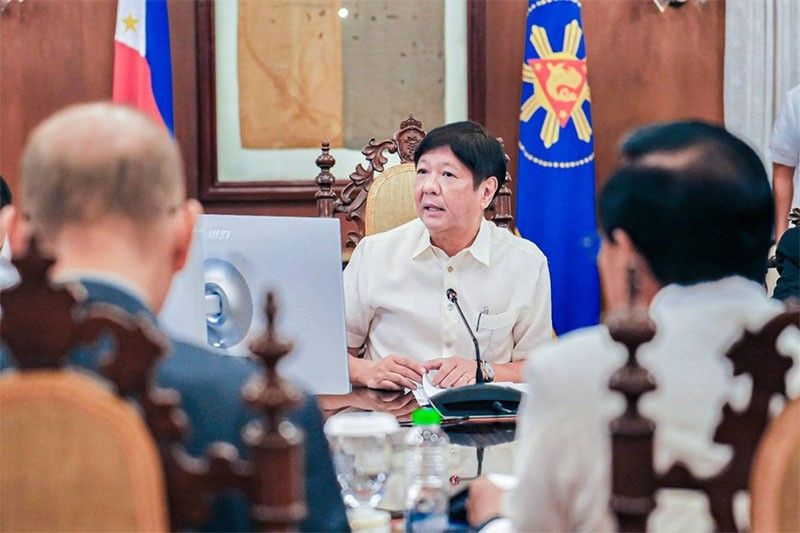What Marcos has accomplished one year into his presidency

MANILA, Philippines (Updated July 4, 2023; 7:32 p.m.) — President Ferdinand Marcos Jr. has signed six pieces of legislation after one year into his term as the 17th president of the Philippines.
However, only three out of the six laws enacted are part of the 42 priority bills proposed by his office’s Legislative Executive Development Advisory Council.
What are these laws?
- SIM Registration Act (Republic Act 11934)
Sen. Grace Poe, who sponsored the measure, said in a statement that this law has “adequate safeguards that will vouch for consumers’ right to privacy while ensuring a safe and secure mobile use.”
This was in response to a temporary restraining order filed by Junk SIM Registration Network before the Supreme Court on the law’s implementation. The National Union of Journalists of the Philippines and other groups also questioned the measure’s constitutionality, but the SC later junked the TRO.
In May, however, the Department of Information and Communications Technology said that scammers have adapted to the law, saying that malicious actors have reprogrammed their approach to text scams. Their scams now range from sending messages to putting up fake SIM registration sites to capture personal information online, the DICT said.
- Postponement of Barangay / SK Elections (RA 11935)
Marcos in October signed into law the bill to move the barangay and Sangguniang Kabataan elections to October 2023. This measure allowed incumbent officials to keep their posts on a holdover capacity unless they are suspended or removed from office.
However, the SC on June 27 declared the law unconstitutional, although it ordered the October elections to push as stated under RA 11935.
- Attrition Law / Amendments on the Fixed Term of Armed Forces of the Philippines Officials (RA 11939)
This law amends the rules on the fixed terms and tours of duty of the AFP chief of staff and other senior military officials. It amended five sections under RA 11709 to get rid of the “revolving-door policy” in the military by fixing the terms of key officers.
Under the new law, the chief of staff will be the only officer to have a maximum tour of duty of three consecutive years unless the president terminates the tour sooner. The law also states that the compulsory retirement of the chief of staff will occur upon the completion of the tour of duty or upon relief by the country’s chief executive.
This law also changed the compulsory retirement of those in the grades of second lieutenant/ensign to lieutenant general/vice admiral to the age of 57. In the previous RA 11709, officers in the grade of brigadier general/commodore to lieutenant general/vice admiral had a compulsory retirement at the age of 59.
What does this tell about Congress?
Aries Arugay, political analyst and head of the University of the Philippines Department of Political Science, told Philstar.com that Congress is “not really cooperating" with the administration.
He noted that given that Marcos’ allies make up the supermajority bloc in both the lower and upper houses, there should be no reason why there is a “poor record” of realizing his legislative agenda, an instance that Arugay described as something that “confounds many.”
“Unfortunately, that [Marcos’] political capital is not being perceived as something that is worthy for Congress to act and do its job in legislation,” Arugay said.
Only six laws were enacted in his first year
While Arugay emphasized that Congress can always say that it is an independent branch of the government and cannot always agree with the president, the bills proposed by the Marcos administration are supposed to realize the campaign promises, if not the vision of the president.
According to the political analyst, Congress does not seem to share the same vision as the president, which is a problem when one has no strong party system. If the president had a strong party system, his bills would have already been approved at the party level alone.
With only six laws enacted in his first year, Arugay said that this could also mean that Congress has other ideas on how to address some of the important problems that the administration is trying to solve. The analyst said that the House and the Senate evidently have other priorities aside from those of the president’s, including charter change.
“This is the problem if your congress has a lot of distractions,” he said.
Why did the president prioritize the three measures?
The three measures – SIM Registration Act, postponement of barangay and SK elections, AFP officials’ fixed term – have economic implications, Arugay said.
He explained that the SIM Registration Act was a priority as it was a continuation of the efforts of the previous administration. Regarding the postponement of the barangay and SK elections was also a priority due to economic implications, the fact that the high court declared it unconstitutional, Arugay said that the government wasted a lot of time and resources. Meanwhile, the amendment to the Attrition Law was important so that Marcos could have control over the armed forces, Arugay said.
What about the controversial Maharlika Investment Fund Bill?
This bill, according to Arugay, was “off the cuff,” because it was never mentioned even before Marcos’ campaign. He also said that had this bill been floated during the campaign, it would have come off as a “red flag” for Marcos “because things like this rely on trust and confidence with the government.”
“Even though Congress can pass this bill and even with Marcos’ political capital, there will still be a segment of the population that will be highly distrustful because of the baggage that Marcos brings into the presidential office given the history of their political dynasty,” he said.
Looking at Marcos’ priorities
Arugay said that there are certain aspects that really needed focus on. However, some of Marcos’ presidential trips were unnecessary and excessive. The political analyst said that some of the trips were important, such as his trips to the Philippines’ allies and partners like China, Japan, and the United States. But there are some that are questionable, including attending the coronation of King Charles III.
To be fair, Arugay said that Marcos is only in his first year as president, which is a time for direction setting. On that front, the political analyst said that Marcos has “efficaciously done his duties.” However, he somehow failed to focus on the economy.
“This [economy] is very important because these are the things experienced by the ordinary Filipino on a daily basis,” Arugay said.
But Arugay emphasized that Marcos is still in the honeymoon period and has just finished his first year. Arugay also thinks that some Filipinos do not have enough information to make the judgment that the economic problems faced by the country these days are the government’s fault.
In the first year, it is acceptable for people not to blame economic problems on the government. However, the political analyst said that if such problems are not solved in the succeeding years, people must be able to attribute blame on something or someone.
“It is not sustainable for people not to blame their government for their hardships, especially economic hardships,” he said.
What else should Marcos prioritize?
The economy should be prioritized, which Arugay believes Marcos and his administration know. However, the analyst said that Marcos’ approach is very much focused on macroeconomics and big business, noting that the economy is not all about big businesses. The administration should also engage all other sectors.
Marcos should also prioritize bureaucratic control.
“I think as president, he needs to further control his bureaucracy, the executive agency. He needs to make sure that everyone is doing their job, and that under him, those who are poorly performing and even engaged in anomalies or corrupt practices will be made accountable," Arugay said.
More needs to be done in imposing some form of compliance, command, and control in the government, according to the analyst.
Another thing that Marcos should prioritize is his legislative agenda. It would not send a good signal if Marcos needs to repeat what he previously said as his legislative agenda during his first year.
According to Arugay, Marcos, as president, must be able to use the tools that he has for Congress to cooperate with him.
(Editor's Note: This has been updated to reflect that only the temporary restraining order against the SIM Registration Act has been denied.)
- Latest
- Trending





























